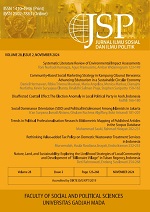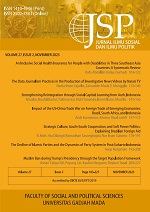Strategic Culture, South-South Cooperation, and Soft Power Politics: Explaining Brazilian Foreign Aid
R. Moh. Hiu Dilangit Ramadhan Sasongkojati(1*), Nur Iman Subono(2)
(1) Department of American Studies, University of Indonesia, Indonesia.
(2) Department of Political Science at the Faculty of Social and Political Sciences, University of Indonesia, Indonesia.
(*) Corresponding Author
Abstract
What drives Brazil to provide foreign aid to other developing countries? Historically part of the Global South, its active foreign policy strives to become a global power. While research has highlighted Brazil’s foreign policy objectives in providing aid, such as expanding its diplomatic reputation and exporting its development experience abroad, little has been done to note the strategic properties that motivate the development assistance initiatives. Additionally, the emphasis on South-South Cooperation in Brazil’s aid practice is relevant to the literature on the motives of emerging donors. This article assesses Brazil’s act to provide foreign aid between 2003 and 2016 using the theoretical concept of strategic culture, which refers to the nation’s historical norms and values that inform the strategic act of providing foreign aid. We use primary and secondary data that cover findings from official government sources, policy documents, and academic literature. We argue that cultural elements support the formulation of a foreign policy that seeks to expand Brazil’s influence abroad through development assistance diplomacy. Using foreign aid to counteract its material limits, the goal is to raise Brazil’s stature among developing nations and global affairs and maximize its soft power in the South-focused power structure within the post-Cold War multipolar global order.
Keywords
Full Text:
PDFReferences
AidData. (2012). AidData Research Release (Version 2.1) [Data set]. AidData. https://www.aiddata.org/data/aiddata-research- release-2-1
AidData: Brazil’s South-South Cooperation, 2005-2011. AidData, a research lab at William and Mary. (2012, January 1). https://www.aiddata.org/data/brazils-south-south- cooperation-2005-2011
Amato, F. (2015). Balança comercial registra em 2014 primeiro déficit desde 2000. Economia. http://g1.globo.com/economia/noticia/2015/01/balanca-comercial-registra-em-2014- primeiro-deficit-desde-2000.html
Baldwin, D. A. (1966). Analytical Notes on Foreign Aid and Politics. Background, 10(1), 66. https://doi.org/10.2307/3013712
Baylis, J., Wirtz, J. J., & Gray, C. S. (Eds.). (2013). Strategy in the contemporary world: An introduction to strategic studies (4th edition). Oxford University Press.
Bergamaschi, I., Moore, P. V., & Tickner, A. B. (Eds.). (2017). South-South cooperation beyond the myths: Rising donors, new aid practices? Palgrave Macmillan.
Bloomfield, A. (2012). Time to Move On: Reconceptualizing the Strategic Culture Debate. Contemporary Security Policy, 33(3), 437–461. https://doi.org/10.1080/13523260.2012.727679
Brands, H. (2011). Evaluating Brazilian Grand Strategy under Lula. Comparative Strategy, 30(1), 28–49. https://doi.org/10.1080/01495933.2011.545686
Brazil Investment: % of GDP | Economic Indicators | CEIC. (n.d.). https://www.ceicdata.com/en/indicator/brazil/investment--nominal-gdp
Cabral, L., & Weinstock, J. (2010). Brazilian technical cooperation for development. Official Development Institute. https://odi.org/en/publications/brazilian-technical-cooperation-for-development/
Cardoso, F. H. (1998). Discurso na sessão de trabalho da VIII Reunião de Chefes de Estado e de Governo da Conferência Ibero-Americana. Biblioteca da Presidência da República. http://www.biblioteca.presidencia.gov. br/presidencia/ex-presidentes/fernando- henrique-cardoso/discursos/1o-mandato/1998-2-semestre/18-de- outubro-de-1998-discurso-na-sessao- de-trabalho-da-viii-reuniao-de-chefes- de-estado-e-de-governo-da-conferencia- ibero-americana/view
Cooperation from Brazil to abroad (south-south cooperation). ABC-Agência Brasileira de Cooperação. (n.d.). https://www.gov.br/abc/en/access-to-information/actions-and-programmes-1/cooperation- from-brazil-to-abroad/cooperation-from- brazil-to-abroad-south-south-css
Dreher, A., Nunnenkamp, P., & Thiele, R. (2011). Are ‘New’ Donors Different? Comparing the Allocation of Bilateral Aid Between nonDAC and DAC Donor Countries. World Development, 39(11), 1950–1968. https://doi.org/10.1016/j.worlddev.2011.07.024
Fuchs, A., & Vadlamannati, K. C. (2013). The Needy Donor: An Empirical Analysis of India’s Aid Motives. World Development, 44, 110–128. https://doi.org/10.1016/j.worlddev.2012.12.012
Gray, C. S. (1999). Strategic culture as context: The first generation of theory strikes back. Review of International Studies, 25(1), 49–69. https://doi.org/10.1017/S0260210599000492
Guimarães, F. de S., & Almeida, M. H. T. de. (2017). From Middle Powers to Entrepreneurial Pow ers in World Politics: Brazil’s Successes and Failures in International Crises. Latin American Politics and Society, 59(4), 26–46. https://doi.org/10.1111/laps.12032
Huntington, S. P. (1999). The Lonely Superpower. Foreign Affairs, 78(2), 35–49. https://doi.org/10.2307/20049207
Hurrell, A. (1992). Brazil as a Regional Great Power: A Study in Ambivalence. In I. B. Neumann (Ed.), Regional Great Powers in International Politics (pp. 16–48). Palgrave Macmillan UK. https://doi.org/10.1007/978-1-349-12661-3_2
Hurrell, A. (2010). Brazil and the New Global Order. Current History, 109(724), 60–66. https://doi.org/10.1525/curh.2010.109.724.60
Inoue, C. Y. A., & Vaz, A. C. (2012). Brazil as ‘Southern donor’: Beyond hierarchy and national interests in development cooperation? Cambridge Review of International Affairs, 25(4), 507–534. https://doi.org/10.1080/09557571.2012.734779
Instituto de Pesquisa Econômica Aplicada. (2014). Cooperação brasileira parao desenvolvimento internacional 2011-2013. Instituto de Pesquisa Econômica Aplicada; Repositório do Conhecimento do Ipea. https://repositorio.ipea.gov.br/ handle/11058/7110
Johnston, A. I. (1995). Thinking about Strategic Culture. International Security, 19(4), 32–64. https://doi.org/10.2307/2539119
Kalil, M., & Braveboy-Wagner, J. (2016). Brazil’s International Rise in the Twenty-First Century: Ambitions and Difficulties. In J. Braveboy-Wagner (Ed.), Diplomatic Strategies of Nations in the Global South (pp.27–58). Palgrave Macmillan US. https://doi.org/10.1057/978-1-137-45226-9_2
Klein, B. S. (1988). Hegemony and strategic culture: American power projection and alliance defence politics. Review of International Studies, 14(2), 133–148. https:// doi.org/10.1017/S026021050011335X
Lafer, C. (2000). Brazilian International Identity and Foreign Policy: Past, Present, and Future. Daedalus, 129(2), 207–238.
Lantis, J. S. (2002). Strategic Culture and National Security Policy. International Studies Review, 4(3), 87–113. https://doi.org/10.1111/1521-9488.t01-1-00266
Malamud , A . (2011). A L ead er Witho ut Followers? The Growing Divergence Between the Regional and Global Performance of Brazilian Foreign Policy. Latin American Politics and Society, 53(3), 1–24. https://doi.org/10.1111/j.1548-2456.2011.00123.x
Mares, D. R., & Trinkunas, H. A. (2016). Aspirational power: Brazil on the long road to global influence. Brookings Institution Press.
Mearsheimer, J. J. (2001). The Tragedy of Great Power Politics (Updated edition). W.W.Norton & Company.
Ministério da Defesa. (2012). Livro Branco de Defesa Nacional. Governo do Brasil. https://www.gov.br/defesa/pt-br/arquivos/estado_e_defesa/livro_branco/Versao2012dolivroLBDNemingles.pdf
Morgenthau, H. (1962). A Political Theory of Foreign Aid. American Political Science Review, 56(2), 301–309. https://doi.org/10.2307/1952366
Mughanda, M. (2011). Inquiry on self-interested foreign aid: Insights from the ODA-migrations link in SSA countries. African Journal of Political Science and International Relations, 5(4), 164–173.
NET official development assistance and official aid received (constant 2020 US$)-Brazil. World Bank Open Data. (n.d.). https://data.worldbank.org/indicator/DT.ODA. ALLD.KD?locations=BR
Pauselli, G. (2021). New Donors, New Goals? Altruism, Self-Interest, and Domestic Political Support in Development Cooperation in Latin America. Latin American Politics and Society, 63(4), 45–73. https://doi.org/10.1017/lap.2021.37
Prantl, J. (2022). Reuniting strategy and diplomacy for 21st century statecraft. Contemporary Politics, 28(1), 1–19. https://doi.org/10.1080/13569775.2021.1961387
Presidência da República Secretaria de Imprensa. (2010). Discurso do Presidente da República, Luiz Inácio Lula da Silva, porocasião da visita do presidente da Zâmbia, Rupiah Banda, ao Brasil Palácio Itamaraty, Brasília-DF, 18 de novembro de 2010. Presidência da República do Brasil.
Quadir, F. (2013). Rising Donors and the New Narrative of ‘South–South’ Cooperation: What prospects for changing the landscape of development assistance programmes? Third World Quarterly, 34(2), 321–338. https://doi.org/10.1080/01436597.2013.775788
Selcher, W. A. (1981). Brazil In The International System: The Rise of a Middle Power (1st ed.). Routledge.
Spektor, M. (2022). Strategies of rising Brazil: Postmortem review, looking forward. Contemporary Politics, 28(1), 20–37. https:// doi.org/10.1080/13569775.2021.1961452
Stuenkel, O. (2016). Post-western world: How emerging powers are remaking global order. Polity.
Stuenkel, O. D. C. (2021). Brazil’s Role in the Global Order After Bolsonaro. The Frederick S. Pardee Center for the Study of the Longer-Range Future, Pardee School of Global Studies, Boston University. https://www.bu.edu/pardee/files/2021/11/RPI03. pdf
Tian, N., Fleurant, A., Wezeman, P. D., & Wezeman, S. T. (2017). Trends in World Military Expenditure 2016 (SIPRI Fact Sheet). Stockholm International Peace Research Institute.
Trinkunas, H. A. (2015, February 3). Brazil’s Global Ambitions. Americas Quarterly. https://www.americasquarterly.org/ fulltextarticle/brazils-global-ambitions/
Under Secretariat General for Cooperation and Trade Promotion. (2007). South-South Cooperation Activities Carried out by Brazil. Ministério das Relações Exteriores. http://funag.gov.br/loja/download/421-South-South_Cooperation_Activities_Carried_ Out_By_Brazil.pdf
V., A. (2020). Revisiting the Discourse on Strategic Culture: An Assessment of the Conceptual Debates. Strategic Analysis, 44(3), 193–207. https://doi.org/10.1080/09700161.2020.1787684
Vigevani, T., & Cepaluni, G. (2007). Lula’s foreign policy and the quest for autonomy through diversification. Third World Quarterly, 28(7), 1309–1326. https://doi.org/10.1080/01436590701547095
Villa, R. D., Chagas-Bastos, F. H., & Braga, C. de M. (2019). Hybrid Security Governance in South America: An Empirical Assessment. Latin American Politics and Society, 61(4),72–94. https://doi.org/10.1017/lap.2019.25
Why Brazil sought Chinese investments to diversify its manufacturing ... (2022, October 18). https://carnegieendowment.org/2022/10/18/why-brazil-sought-chinese-investments-to-diversify-its-manufacturing-economy-pub-88194
Article Metrics
Refbacks
- There are currently no refbacks.
Copyright (c) 2023 Jurnal Ilmu Sosial dan Ilmu Politik

This work is licensed under a Creative Commons Attribution-ShareAlike 4.0 International License.























